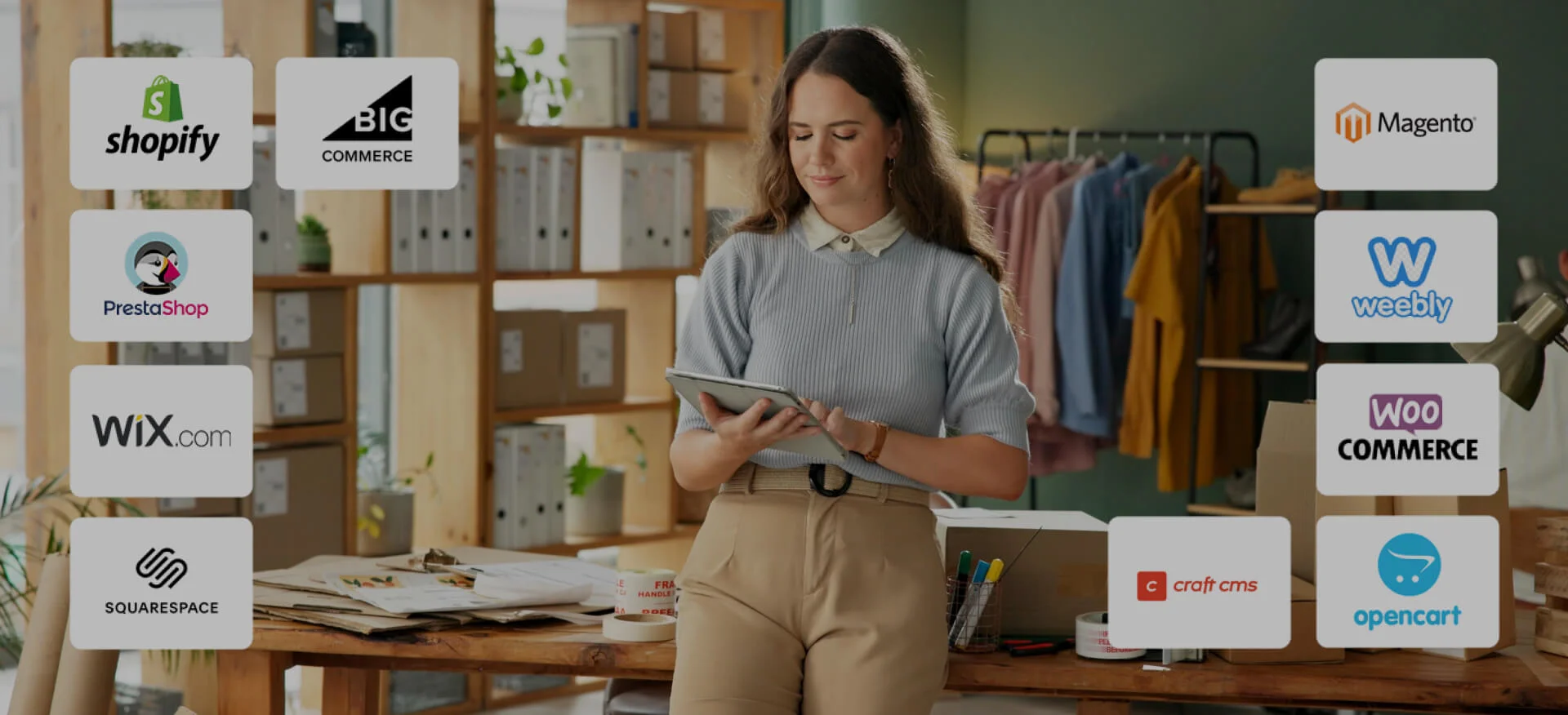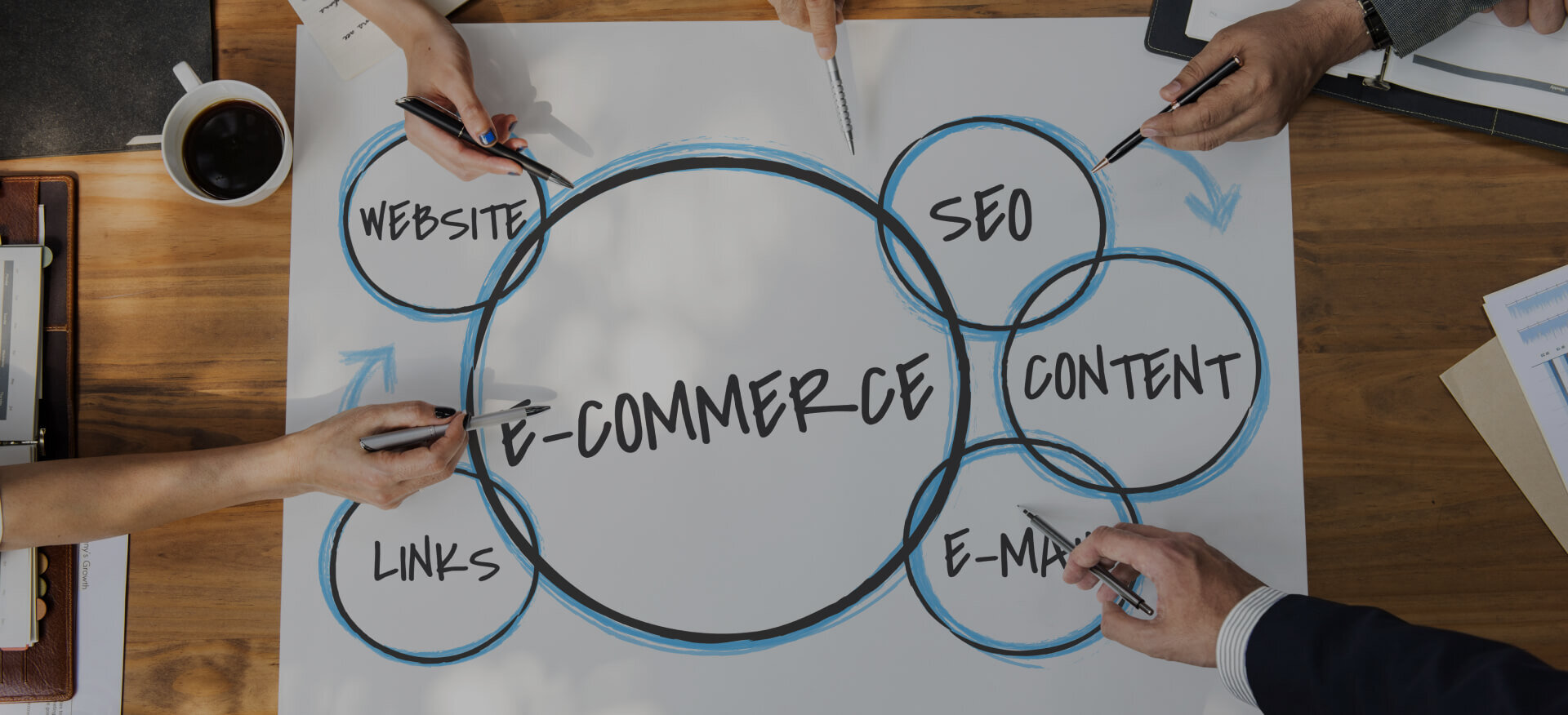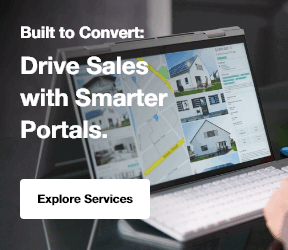Starting an online store is one of the smartest moves a small business can make. With consumers increasingly shopping online, even niche and local brands now compete on a global scale. But with so many platforms, from Shopify and WooCommerce to BigCommerce and beyond, finding what Is The Best eCommerce Platform for Small businesses can feel overwhelming.
The right platform isn’t just about building a website; it’s about creating a professional, scalable storefront that supports your growth, delivers a seamless shopping experience, and helps you stand out in a competitive market. In this guide, you’ll learn what an eCommerce platform is, the most important features to consider, the benefits and challenges of using one, and the trends shaping the future of online retail.
What Is an eCommerce Platform for Small Businesses?
An eCommerce platform is the software that powers an online store, giving small businesses everything they need to sell products or services digitally.
It enables easy product management by letting owners add, edit, and organize items with images, descriptions, and prices; provides secure payment processing through gateways like PayPal, Stripe, Apple Pay, or Google Pay; streamlines order and inventory tracking by monitoring stock levels, fulfilling orders, and managing shipping from one dashboard; and offers built-in marketing and analytics tools to promote products and measure performance.
The right eCommerce platform, when combined with effective ecommerce marketing strategies, helps your store stand out in a competitive market. The best eCommerce platforms are designed to be simple enough for beginners to use while offering the flexibility to grow and scale as the business expands.
Some leading options include:
- Shopify – Quick setup, easy for beginners, and loaded with apps.
- WooCommerce – Open-source and customizable, perfect for WordPress users.
- BigCommerce – Built-in marketing and reporting tools for growing stores.
- Squarespace & Wix – Ideal for creatives who want beautiful design templates.
If your products rely on storytelling, such as artisanal food, organic snacks, or gourmet beverages, your brand identity matters just as much as your platform. Working with a food and beverage branding agency helps you craft a unique look and feel that resonates with your audience.
What are the 5 Core Features of the Best eCommerce Platforms?
When comparing platforms, focus on these five critical features to ensure your store runs smoothly and converts visitors into buyers.
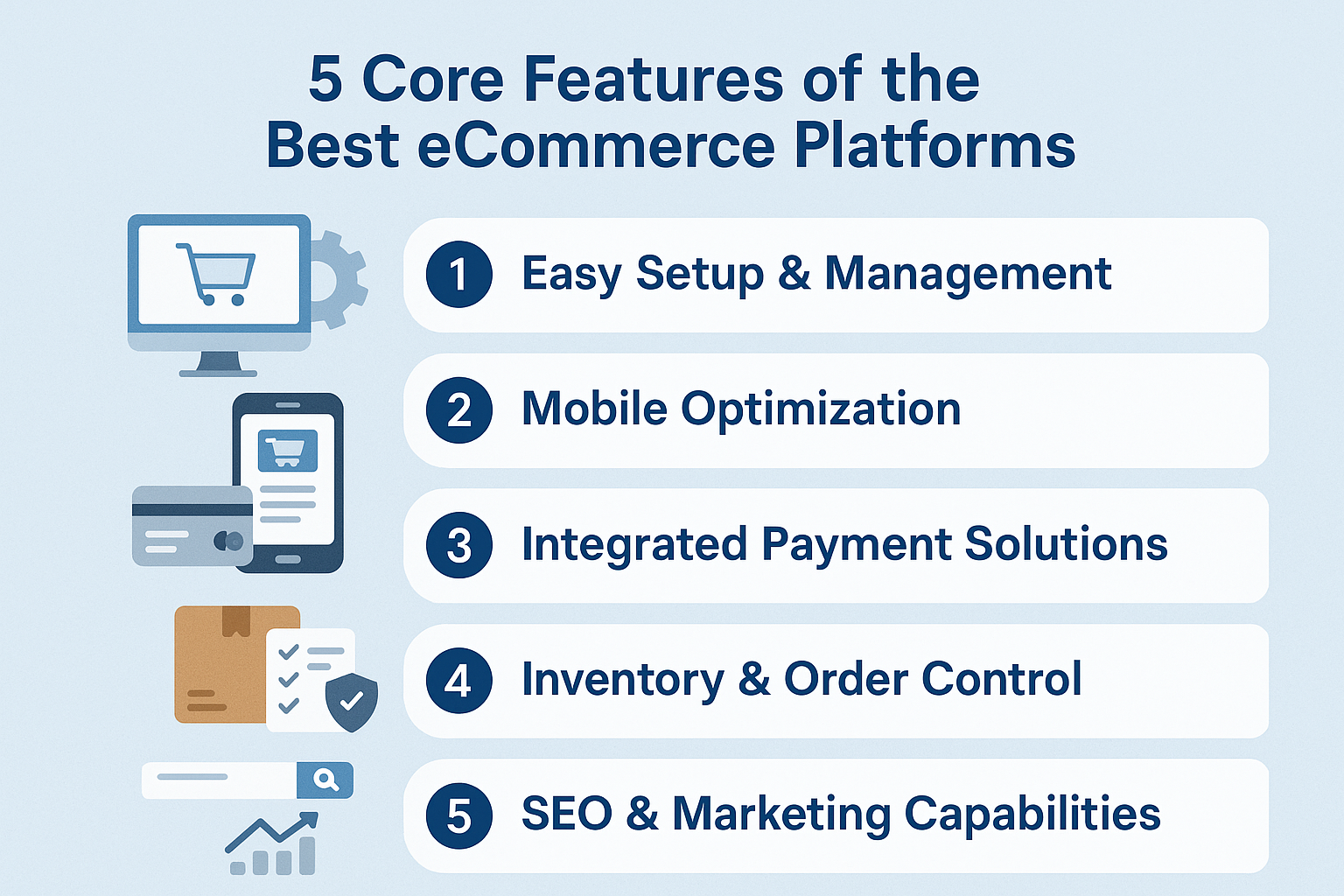
1. Easy Setup & Management
Small business owners often juggle many roles. Platforms such as Shopify and Squarespace offer drag-and-drop tools, pre-designed themes, and minimal technical setup, letting you launch quickly without hiring developers.
2. Mobile Optimization
Over half of online shopping happens on mobile. A platform with a responsive design guarantees your store looks and works perfectly on smartphones and tablets, improving sales and user experience.
3. Integrated Payment Solutions
A seamless checkout builds trust. Choose platforms that support multiple payment gateways, credit cards, PayPal, Apple Pay, and digital wallets- and allow fast one-click checkout.
4. Inventory & Order Control
Good inventory tools prevent overselling, sync stock levels across channels, and automate shipping notifications to keep customers informed.
5. SEO & Marketing Capabilities
Features like customizable URLs, blogging, product tagging, and built-in analytics help your site rank on Google keyword ranking and attract new customers. By implementing growth marketing techniques, you can significantly improve your visibility and increase conversions.
For stores looking to increase traffic and sales, professional SEO services can optimize your website for higher search visibility and more conversions.
Explore Our Ecommerce Marketing Services!
What are the 5 Benefits of Using the Right eCommerce Platform?
A strong platform can transform how you run and grow your online business:
1. Professional Online Presence
Modern, customizable templates let even small shops look polished and credible, competing with established brands.
2. Scalability for Growth
Start with basic features and upgrade as your business expands, add subscriptions, global shipping, or advanced analytics without switching platforms.
3. Cost-Effective Setup
Subscription models bundle hosting, security, and updates, making it affordable compared to custom-built websites.
4. Smart Data Insights
Built-in analytics show sales trends, customer behavior, and campaign ROI, helping you make better decisions.
5. Better Customer Experience
Fast, mobile-friendly stores with smooth checkout improve satisfaction and boost conversions.
To make the most of these benefits, many small businesses rely on expert digital marketing services to run campaigns, reach new customers, and scale revenue.
What 5 Challenges Do Small Businesses Face With eCommerce Platforms?
While platforms simplify online selling, small businesses still encounter challenges such as:
- Learning Curve: Even easy platforms have dashboards, apps, and customization options that take time to master.
- Ongoing Costs: Subscription fees, payment gateway charges, and premium plugins can stretch small budgets.
- Limited Design Flexibility: Pre-made templates sometimes limit brand creativity or advanced features without extra coding.
- High Competition: Standing out against larger brands requires strong marketing and differentiation. This is where performance marketing vs brand marketing comes into play. Many small businesses may choose to focus on direct performance metrics, but blending the two can yield better long-term results.
- Technical Glitches: Slow load times, checkout bugs, or plugin conflicts can disrupt sales and frustrate customers.
Premium brands that need to balance advanced technology with a polished identity often partner with a luxury branding agency to stand out and build trust.
What Role Does Web Design Play in eCommerce Success?
Your website design is more than just visual appeal; it plays a critical role in building credibility and driving conversions. A responsive layout ensures a seamless experience across desktop and mobile devices, creating trust with visitors. Clear navigation with organized menus, categories, and search functions helps shoppers find products quickly and easily. Strong professional branding, including consistent colors, typography, and imagery, reinforces your identity and makes your store memorable. A tech marketing agency can help implement cutting-edge design practices to enhance both function and aesthetics.
A conversion-focused user interface (UI) with clear call-to-action buttons, product reviews, and a simplified checkout process reduces cart abandonment and boosts sales. For a polished, user-friendly online store that turns visitors into loyal customers, investing in expert web design & development is a smart business decision.
5 Emerging Trends in Small Business eCommerce
eCommerce is evolving quickly. These trends are reshaping how small businesses sell online:
- AI Personalization: Platforms analyze data to recommend products and offer tailored discounts.
- Voice Commerce: Shopping through Alexa, Google Assistant, or Siri is gaining popularity.
- Social Media Integration: Instagram, TikTok, and Facebook enable direct purchases, merging shopping and social content.
- AR & VR Shopping: Virtual try-ons and previews reduce returns and boost buyer confidence.
- Subscription & Membership Models: Monthly deliveries or curated boxes drive recurring revenue.
Small businesses can stay ahead of these changes with the help of a tech marketing agency that understands emerging platforms and consumer behaviors.
What Skills or Roles Are Essential to Running an Online Store?
Even the best eCommerce platform works best when supported by the right expertise. High-quality product photography creates clear, attractive visuals that influence buying decisions, while strong copywriting and SEO ensure your product descriptions rank well and convert shoppers. A well-planned marketing strategy, including paid ads, email campaigns, and social media, drives traffic and builds brand awareness.
Excellent customer service fosters loyalty and positive reviews, while effective use of data and analytics helps refine pricing, promotions, and inventory management. For businesses expanding globally or targeting travel-minded audiences, partnering with a travel marketing agency ensures your messaging resonates across different cultures and markets.
What Does the Future Hold for Small Business eCommerce?
The next decade promises even more opportunity for small brands:
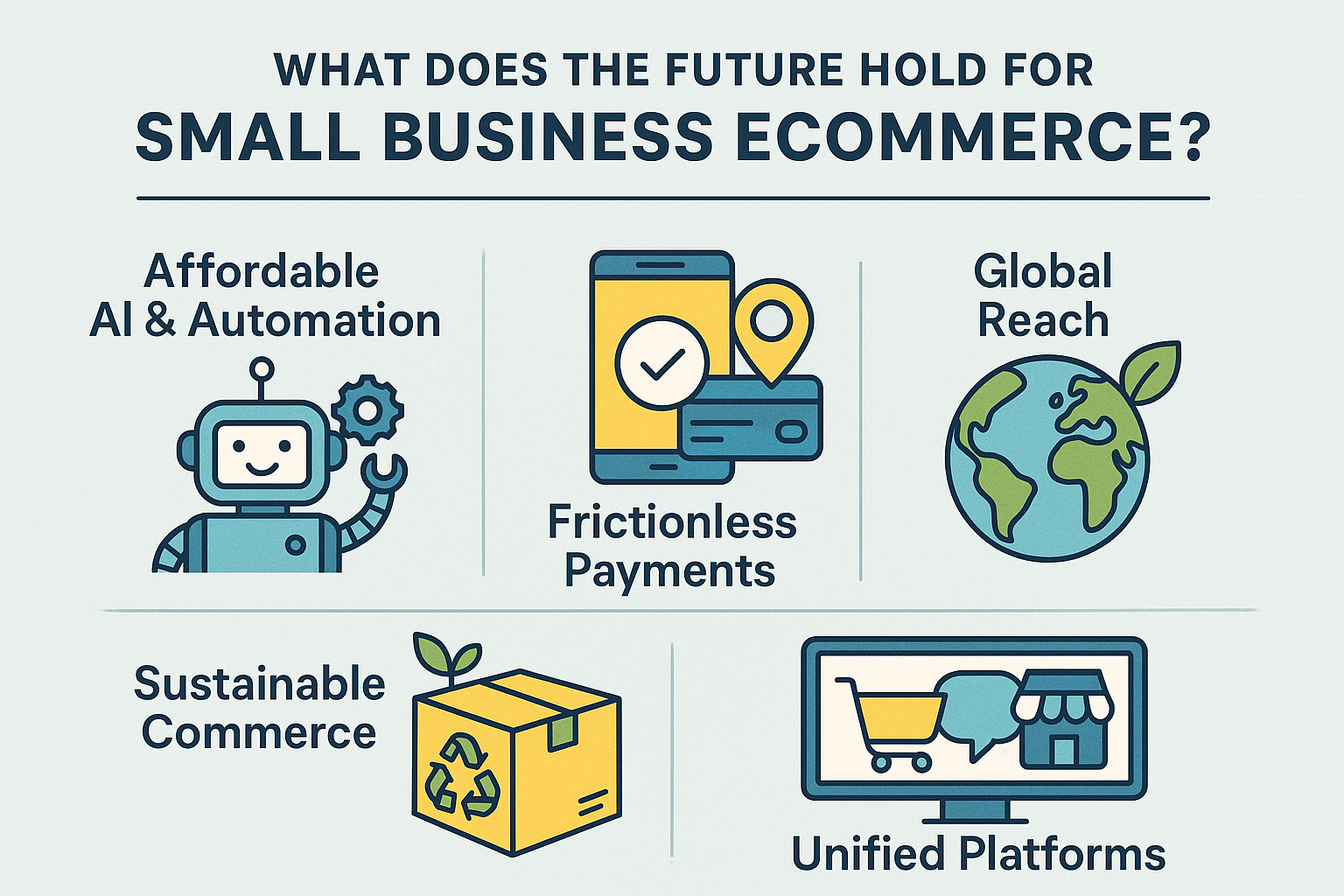
- Affordable AI & Automation: Chatbots, inventory forecasting, and automated campaigns will become accessible.
- Frictionless Payments: One-click checkout, digital wallets, and buy-now-pay-later options will become the norm.
- Global Reach: Better shipping and logistics tools will help small businesses compete worldwide.
- Sustainable Commerce: Eco-friendly packaging and carbon-neutral shipping will attract environmentally conscious buyers.
- Unified Platforms: Central dashboards will merge inventory, marketing, and analytics for easier management.
As more businesses shift online, many potential entrepreneurs still ask, Is eCommerce legit? Rest assured, the industry’s growth and the advances in technology prove that eCommerce is a powerful, legitimate way to build a business and reach global customers. To prepare for these advancements, many brands invest in application engineering & development to create scalable, future-proof websites that stay ahead of the competition, helping small businesses gain an edge in top search engines.
Explore Our Digital Marketing Services!
FAQs About the Best eCommerce Platform for Small Businesses
What is the easiest eCommerce platform for beginners?
Shopify is the easiest to start with, offering drag-and-drop tools, themes, and apps so you can launch without coding.
Which platform is best for SEO?
WooCommerce offers advanced SEO flexibility for WordPress users, while Shopify provides strong built-in tools for simple optimization.
Can I start an eCommerce store for free?
Yes. WooCommerce and Square Online let you start free, though premium themes, hosting, and features may add costs.
What’s the best platform for selling digital products?
Shopify, Gumroad, and WooCommerce excel at digital goods, with secure delivery and simple customer management.
How much does an eCommerce platform cost?
WooCommerce can be free but needs hosting, while Shopify and BigCommerce plans range from $29 to $299 per month.
Conclusion
What Is The Best eCommerce Platform for Small business? Choosing the best eCommerce platform for small business is one of the most important decisions an entrepreneur can make. The right solution goes beyond simply launching a website; it powers a seamless shopping experience, builds trust, and supports long-term growth in a competitive online marketplace. Success, however, isn’t just about the platform itself. It’s about how you brand your store, attract qualified traffic, and convert visitors into loyal customers through great design, search optimization, and marketing strategy. By leveraging performance marketing, small businesses can effectively scale their operations and reach more customers.
That’s where Centric can help. We specialize in helping small businesses select the best eCommerce platform for small business, design high-performing online stores, and execute digital marketing strategies that drive real sales growth. Whether you’re launching your first shop or expanding globally, Centric ensures your online business doesn’t just compete, it thrives and scales for the future.
